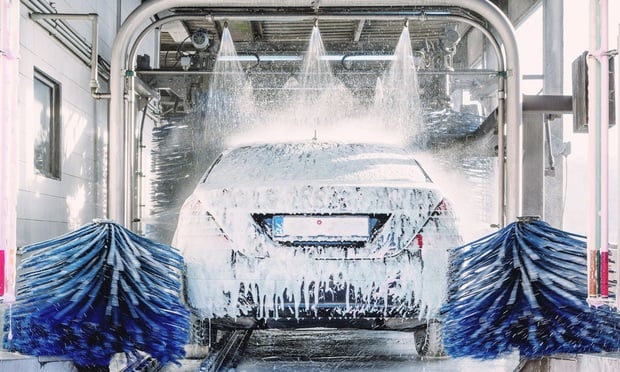Anyone around in the 1970’s is sure to remember the hit song by Rose Royce titled “Car Wash,” as it was one of the most notable successes during the ‘70s disco era and was featured in the 1976 film with the same name. However, over the past few years, the term “car wash” has taken on a new success, especially in the commercial real estate industry – more specifically, within the net lease sector – with both private and institutional investors.
Up until a few years ago, the real estate associated with a car wash facility was generally bundled into the combined sale of the business operation and equipment to a new user or business owner. Today, however, astute operators are realizing they can best maximize their investment by executing a long-term lease for the underlying real estate and selling it off to a private net lease investor seeking a long-term passive investment.
According to the International Car Wash Association, more than 2.0 billion cars are washed each year in North America, and in 2019, 83.0 percent of Americans who own or lease a car used a professional car wash facility, generating more than $11.0 billion in retail sales.
Additionally, the recent impact of COVID-19 has further bolstered the industry as no-touch car wash facilities have earned the “essential business” designation in a number of markets across the country. As investor demand has become focused on service-based retail tenants that are recession-proof and internet resistant, single-tenant net lease car wash properties have surfaced as an attractive alternative to more traditional net lease retail properties including quick service restaurants, automotive stores, drugstores and dollar stores. Here, we discuss five key reasons why net lease investors are taking notice of this up-and-coming asset class.
- Recession-Resistant = Low Cost/Subscription-Based Service Model
Today, many of the net lease car washes being sold on the market are express conveyor style car washes versus the full-service model. Price points range from about $3.00 to $10.00 per customer which has proven to be a cost-effective way for consumers to maintain a clean vehicle. Additionally, a growing trend is for operators to offer loyalty programs to its customer base. When customers can purchase a monthly subscription service allowing unlimited washes at a fixed cost, this translates to “sticky” revenue for operators, making car wash facilities even more recession-proof.
- Multiple Sources of Income Strong Balance Sheets
Many of the full-service car wash facilities have multiple sources of revenue and income in addition to the car wash operations. For example, some full-service locations offer gasoline or fuel, convenience stores, and in some cases a quick service dining option that is tied into the overall operation. Collectively, the additional income generators strengthen an operator’s EBITDA – a figure which is typically evaluated when determining the tenant’s ability to fulfill their future rent obligations.
- Attractive Coverage Ratios Overshadow Credit Profile
In most cases, rent coverage ratios for car wash facilities strive to be between 2.0x and 2.5x EBITDA, which again, helps investors and lenders get comfortable with the tenant’s ability to continue to make good on rent obligations. This is especially true in instances where the tenant is a smaller credit profile tenant or operator. Strong coverage ratios help lessen credit risk and demonstrate to both investors – and even more so lenders – the tenant’s success at a particular site.
- Location, Location, Location Strong Residual Value
The underlying residual value of the car wash location has increasingly become more attractive as well. Typically, car wash locations are fundamentally well-located sites – positioned at or near signalized intersections where they experience high traffic counts with dense surrounding populations. Additionally, the actual improvements of the facility, including the wash equipment, can be expensive which makes it more difficult for the tenant or operator to pack up and move down the street – an option many traditional net lease retail uses have when selecting their sites.
- Long-Term Leases with Fixed Annual Rent Increases Create Synergistic Landlord/Tenant Relationships
Aside from quick service restaurants and a handful of other tenant types, there are not many 15- to 20-year lease term retail options for investors, especially those seeking a passive net lease investment with fixed annual rental increases. In today’s market, investors are seeing fewer and fewer 20-year lease term deals, however, the 20-year lease term has nearly become an industry standard for car wash offerings, which creates a synergistic relationship between a landlord and tenant. From the landlord’s perspective, it provides an investor the opportunity to purchase a long-term, hands off investment with annual rent increases that are typically between 1.0 and 2.0 percent, helping to hedge against any inflationary risk at a 6.0 to 7.0 percent return. On the other hand, selling the underlying real estate via a sale leaseback allows the tenant or operator quick access to additional capital that can be used to either service existing debt or scale their business by opening more locations.
These characteristics will help car wash facilities continue to grow in popularity as strong alternatives to other traditional net lease retail investments. We anticipate demand for this up-and-coming asset class to increase as net lease investors seek well-located, recession- and e-commerce-proof, service-based retail investments with long-term leases, attractive rent growth and strong risk-adjusted returns.
